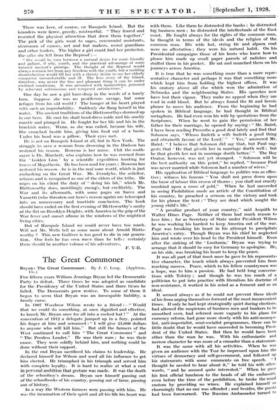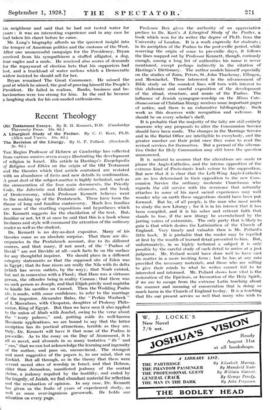The Great Commoner
Fon fifteen years William Jennings Bryan led the Democratic Party to defeat. Three times he was adopted as candidate for the Presidency of the United States and three times he failed. The Democrats grew restive. To some of them it began to seem that Bryan was an inescapable liability, a family curse.
In 1907 Woodrow Wilson wrote to a friend :—" Would that we could- do something, at once dignified and effective, to knock Mr. Bryan once for all into a cocked hat ! " At the convention of 1912 a delegate jumped up in a fury, pointed his finger at him- and screamed : " I will give 25,000 dollars to anyone who will kill him." But still the farmers of the West continued to call him " The Great Commoner " and
The Peerless Leader." He was their man ; he was their cause. They were solidly behind him, and nothing could be done without their support.
In the end Bryan sacrificed his claims to leadership. He declared himself for Wilson and used all his influence to get him elected. He triumphed in his triumph and served him with complete loyalty. It is hard to realize at what a cost in personal ambition that gesture was made. It was the death of the schoolboy's dream. Bryan saw himself passing out of the schoolbooks of his country, passing out of fame, passing out of history.
In a way the Western farmers were passing with him. He was the incarnation of their spirit and all his-life his heart was
with them. Like them he distrusted the banks ; he distrusted big business men ; he distrusted the intellectuals of the East coast. He fought always for the rights of the common man, he thought in terms of the ideals and the religion of the common man. His wide hat, string tie and alpaca coat were no affectation ; they were his natural habit. On his Presidential campaigns those of his hosts who knew how to please him made up small paper parcels of radishes and stuffed them in his pocket. He sat and munched them on his journeys across America.
It is true that he was something more than a mere repre- sentative character and perhaps it was that something more which kept him from holding the highest offices. It was his oratory above all' else which won the admiration of Nebraska and -the neighbouring States: His speeches now have lost their vigour. They make no appeal when they are read in cold blood. But he always found the fit and heroic phrase to move his audience. From the beginning he had spoken in Biblical language, he had thought in Biblical metaphors. He had even won his wife by quotations from the Scriptures. When he went to gain the permission of her father for their marriage, he opened by saying : " Mr. Baird, I have been reading Proverbs a good deal lately and find that Solomon says, Whoso findeth a wife findeth a good thing and obtaineth favour of the Lord.' " " Yes," answered Mr. Baird, " I believe that Solomon did say that, but Paul sug- gests that ' He that giveth her in marriage doeth well ; but he that giveth her not in marriage doeth better.' " The Boy Orator, however, was not yet stumped. " Solomon will be the best authority on this point," he replied, " because Paul was never married while Solomon had a number of wives."
His application of Biblical language to politics was as effec- tive ; witness his famous " You shall not press down upon the brow of labour this crown of thorns ; you shall not crucify mankind upon a cross of gold." When he had succeeded in seeing Prohibition made an article of the Constitution of his country, he preached a sermon on the victory and took for his phrase the text : " They are dead which sought the young child's life."
" A peculiar product of your country," said Asquith to Walter Hines Page. Neither of them had much reason to love him ; for as Secretary of State under President Wilson he was working his hardest to keep America out of the war. Page was breaking his heart in his attempt to precipitate America's entry. Though Bryan was his chief he neglected him and wrote over his head to the President himself. Even after the sinking of the Lusitania,' Bryan was trying to arrange that it should be easy for Germany to apologize. He, on his side, was breaking his heart to keep the peace.
It was all part of that touch more he gave to his representa- tive character, the touch which always prevented him from reaching success. Peace, which to his fellow countrymen was a hope, was to him a passion. He had held long conversa- tions with Tolstely ; and though he was too much of a politician to put into practice with literalism his doctrine of non-resistance, it worked in his mind as a ferment and as an ideal.
It seemed always as if he could not prevent these ideals of his from urging themselves forward at the most inconvenient times. If only he had kept strategically quiet during elections, had allowed the suspicions of business men and bankers to be smoothed over, had referred more vaguely to his plans for currency reform, had gone more slowly with his anti-monopo- list, anti-imperialist, semi-socialist programmes, there can be little doubt that he would have succeeded in becoming Presi- dent of the United States. But then he would have been other than the man he was. With his enthusiastic and narrow character he was more of a crusader than a statesman.
It was the same with all his activities. When he was given an audience with the Tsar he impressed upon him the virtues of democracy and self-government, and followed up his statements with some comments on free speech. "
thought he needed to hear about it," he told his wife after- wards, " and he seemed quite interested." When he gave
his first official luncheon to the heads of all the embassies, even before the time of the prohibition, he broke the usual custom by providing no wines. He explained himself so charmingly that no one was offended ; and besides, the guests had been forewarned. The Russian Ambassador turned to his neighbour and said that he had not tasted water for years : it was an interesting experience and in any case he had taken his claret before he came.
Mr. Long's biography affords us the queerest insight into the temper of American politics and the customs of the West. After one unsuccessful campaign for the Presidency, Bryan received from his sympathizers a stuffed alligator, a dog, four eagles and a mule. He received also scores of demands for the repayment of election bets that his supporters had lost, and a truckload of water melons which a Democratic widow insisted he should sell for her.
Bryan remained The Great Commoner. He missed the goal at which he aimed, the goal of proving himself the People's President. He failed in realism. Banks, business and be- haviourism were too strong for him. In the end he became a laughing stock for his out-moded enthusiasms.































 Previous page
Previous page